Notting Hill Farmers Market with Elisabeth Luard
The Grande Dame of food writing shows me around her local farmers market
‘I’m older than Jo Biden’
announces when we meet at the school run coffee stall at Notting Hill Farmers Market. She’s just been given a china cup for her coffee and I’m thinking, yes, I’d vote for you for president over Trump any time.The first time I ever saw Elisabeth Luard was at the Oxford Symposium on Food and Cookery about ten years ago (she retired as Chair of the Board of Trustees at the end of her 6 year limit in 2022.)1 I was too in awe to approach her.
The next time I see her, she’s launching her newest book, Squirrel Pie at an event for Les Dames d'Escoffier London. Naturally I buy a copy and she signs it for me. Last year we meet again, at
course for food writers at her home in Sussex, where Elisabeth is muse in residence, lending her wisdom, wicked sense of humour (many anecdotes) and an artists eye on proceedings.Elisabeth describes herself as ‘an author, journalist and broadcaster who writes (mostly) about food and recipes in their historical, geographical and social context.’ Over the years, she’s written around 15 cookery books including her classic European Peasant Cookery2. She’s worked as a botanical artist for Kew and for the great biologist Miriam Rothschild. She’s travelled widely, from Mexico to Africa, brought her family up whilst living in rural Spain and France, from the Isle of Mull to her Welsh farmhouse, and to London in 2017.
She received The Guild of Food Writers' Lifetime Achievement Award in 2016.
I’m delighted to be meeting up with Elisabeth at her local farmers market in Notting Hill Gate in London.
The market takes place every Saturday at Fox primary school. As I arrive, people are already leaving, loaded down with market baskets overflowing with bunches of flowers, bags of tomatoes, leafy salads, creamy new season garlic bulbs, boxes of deep vermilion cherries, and carefully wrapped parcels of fish and poultry, or telling their partners what they’ve purchased. Children are gleefully running around amongst the stalls. Dogs on leads are sniffing hopefully in the direction of the stall cooking up sausages.
Elisabeth’s market routine always begins with the coffee stall. Her grandchildren attended Fox school, and she shows obvious pride that she both edited and wrote the introduction for the 1st edition of the school cookery book, on display on the stall. ‘The recipes from parents and children are from all over the world’ she smiles, ‘so it’s really international and the recipes, are all home recipes so they’re very accurate.’
Her children accompanied her to markets ‘always’. ‘The anarchy of children’ she says. ‘It’s marvellous. They’ll ask all the questions you want to ask. 4 children and 7 grandchildren, so I’ve had access to people who want to ask questions.’
I would love to know if Elisabeth has the same passion for British markets as she does for the markets she wrote about in Spain.
Read the introduction to her book on European Peasant Cookery, and instantly, you’re deep inside a market in Algeciras in Southern Spain…
‘‘…The vegetable stalls which formed its outer ring were piled with unfamiliar greenery; a heap of tagarnina, thistle stems waving with tarantula-like green extremities; bundles of fresh garlic, like ice-white onions; smiling pink segments of watermelon; purple tipped cardoons tied as rosebud bouquets…’’
‘The joy that it’s seasonal’ she tells me, comparing the seafood of Spain with the fish at Notting Hill farmers market;
How does the market inspire your writing or drawing Elisabeth?
She loves the buzz of shopping here.
‘You can buy from people who know what they’re talking about. I will very often ask; are you the cheese-maker, or do you do the fishing? Usually it’s someone who’s not directly involved, but they will know, and they will be able to talk about it, so people are proud of what they’re doing. I’m always very proud I’m buying these things. Yes it can be expensive and maybe if I was still catering for a family of four children, I might be more cautious. As it’s only me, I can afford good stuff and I don’t really go out very much unless I’m reviewing something or somebody as invited me. So eating well at home as one person is absolutely key to going to the market, it’s marvellous.
Time to do some shopping, starting off at The Tomato Stall for padron peppers and an aubergine. Padrons peppers she says, are eaten in Mexico with cheese.
We’ve moved on to Dorset Fish
when I run out of money, I run out of money, and that’s it, I go home
Being Elisabeth, there’s a general conversation with other shoppers about the best way to cook flat fish (in a pan with olive oil, garlic, lemon). Next door at Oliviers Bakery Elisabeth tells me that she’s tired of ‘enormous lumps of chewy bread’. She buys a loaf of soft milk bread and a foccacia. We’re spotted by a group of her friends at the cherry stall where the fruit is swiftly seized upon for earring duty.
We head to talk to Paul at Richard Waller’s free range duck stall. ‘Elisabeth needs a smoked duck breast’ announces one woman, and a duck breast is produced. ‘I have it all week in a salad’ Elisabeth says. ‘You can slice it, it’s completely gorgeous and you don’t need much protein. That’ll do.’ Practical to the last she adds; ‘when I run out of money, I run out of money, and that’s it, I go home.’
At Perry Court Farm she buys apricots ‘I’ve still got beetroot and courgettes from last week. They keep so well!’. Examining the peas Elisabeth recommends cooking them French style. ‘When they’re quite mature, which is something I relate to!’, stewing them with wine, butter, onion and lettuce, and sugar and on you go'.’
Despite the clear blue sky it’s started to rain. Whilst we take shelter I ask about a quote that intrigued me from Elisabeth’s biography ‘My life as a wife’:-
‘Shopping, the everyday tasks we undertake to make things work is how I earn my living. I write of ordinary things’
I’m thinking about a quote from Jane Grigson that’s been at the foot of my emails for many years;
‘We have more than enough masterpieces
What we need is a better standard of ordinariness’
I ask; When you shop here, does it inspire you to write of ordinary things?
‘Oh she was marvellous’ Elisabeth exclaims. I used to see her. I had the privilege, I met her, talked to her. She just put her finger on things and that idea of the ordinary as being interesting is so important otherwise we’re stuck with other people’s views. She was definitely an original, she talked about being within her own tradition, marvelous and a great privilege.’
It was Jane Grigson who invited Elisabeth to join one of the first Oxford symposium discussion weekends, and as Elisabeth says, without it, she might never have embarked on a literary career at all.
‘To actually be able to meet people, I don’t know if it was easier then because there were so few of us interested; Alan Davidson, Claudia Roden ( the current president). Various connections.’ ‘People’ she says, looking at me. ‘They’re not magic. They’re there, talking about ordinary things. That’s the way you learn. You learn all the time from other people.’
We talk briefly about the number of cookery writers with a Jewish descent. She once asked Claudia Roden why she thought this was. Claudia's answer was "Diaspora. We need to remember who we are."
I can sail through life with a serene acceptance
Elisabeth began her working life at the offices of Private Eye, founded by Richard Ingrams. Since 2000 Elisabeth has been writing a food column for The Oldie Magazine, also founded by Ingrams. I’m curious to know if she feels as if she’s come full circle. She tells me about taking over from Jennifer Paterson;
Is there a bucket list, something left you want to do?
‘It’s not about achievements’ she says. ‘It’s a learning process. It never stops. That’s about it really.’
The stalls we visited
Dorset Fish day boat fish direct from Christchurch in Dorset. There’s usually a pre-market queue of people who want to know what fishermen Les has caught and brought from the south coast.
The Tomato Stall for Padron peppers, an aubergine and a cucumber
Richard Waller for smoked duck breast
Rent a Cherry Tree for fresh cherries
Hurdlebrook; Unpasteurised dairy from Somerset were away when we visited but are generally at market every week. Elisabeth had brought her bottle back to be refilled.
Perry Court Farm; Kent grown apricots and a cauliflower
Rookery Farm; organic free range eggs from Sussex
Oliviers Bakery, Traditional French bread made in London
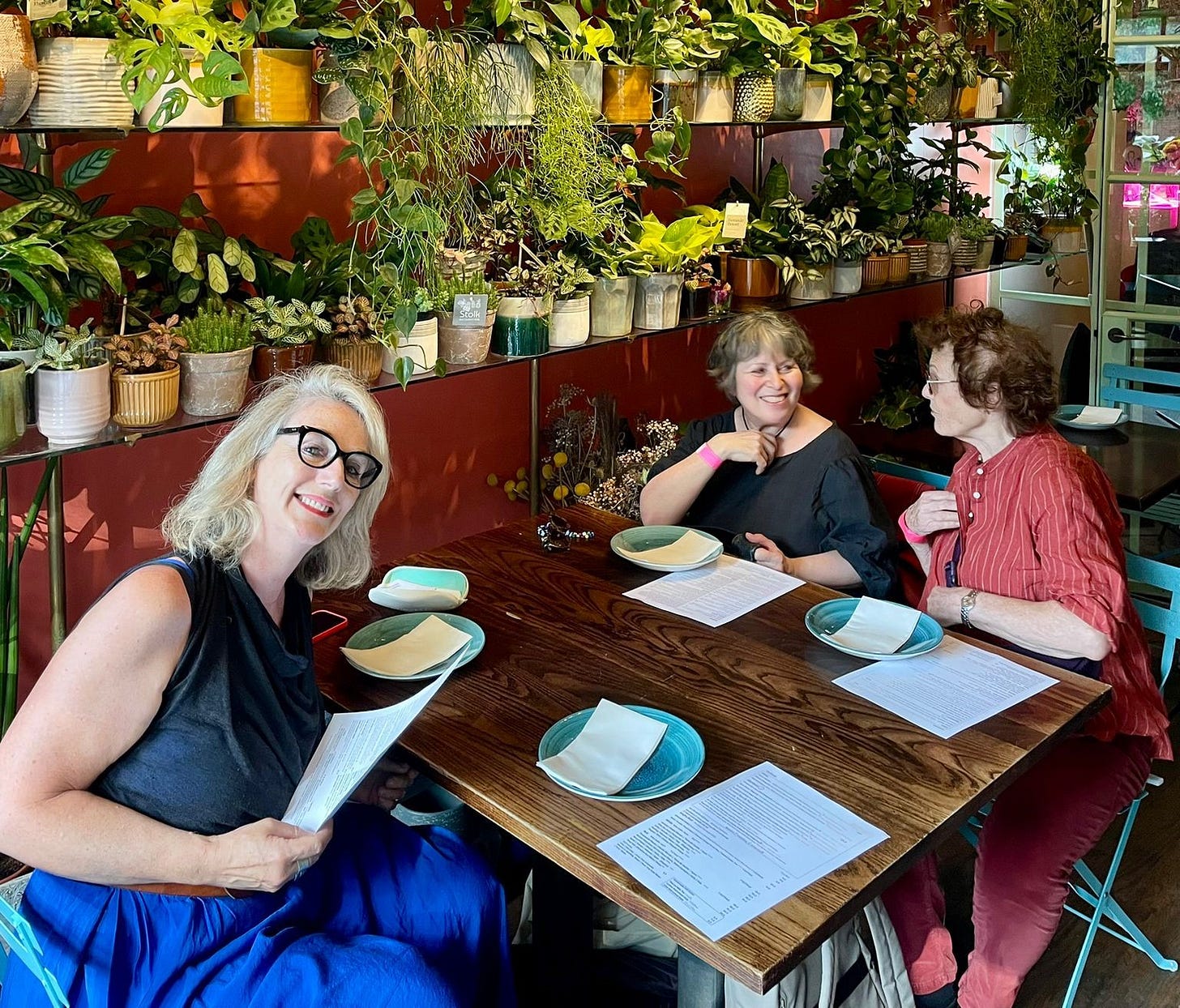
Notting Hill Farmers Market; Every Saturday 10am-2pm


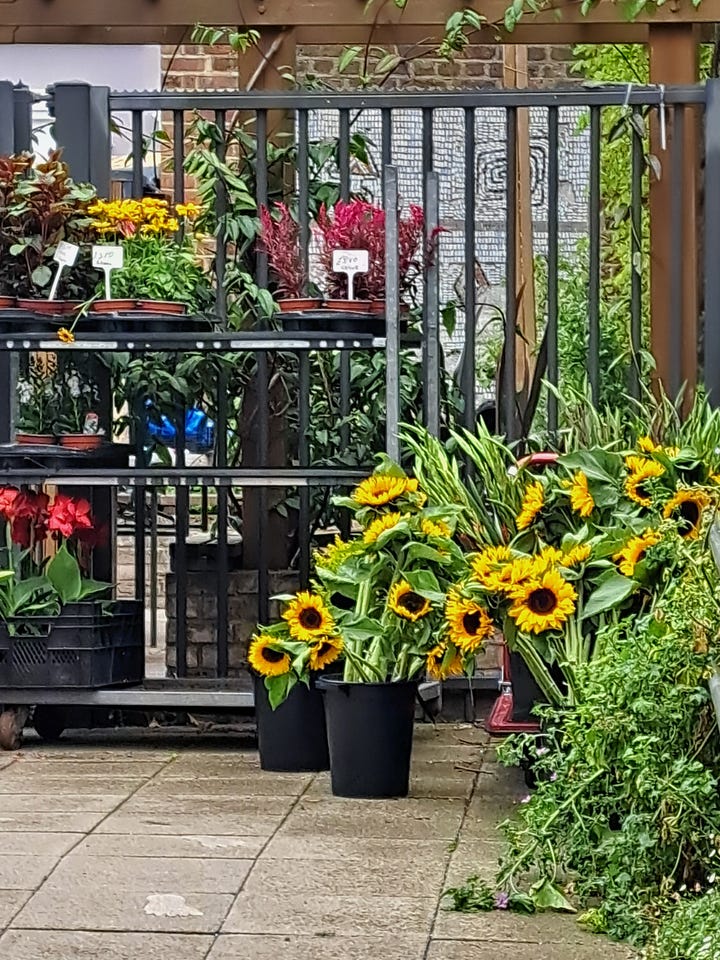
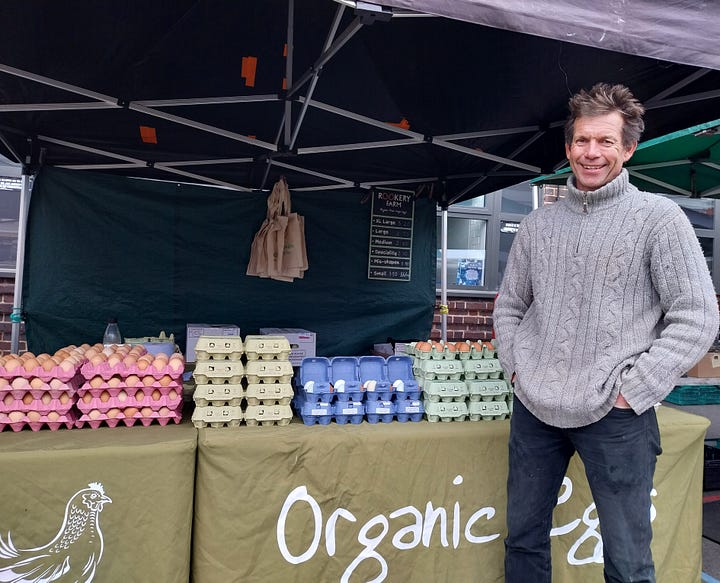
Find out more about Elisabeth’s paintings and writing HERE and do check out her series ‘The Rich Tradition based upon her book on European peasant food, made for television and now free to view
The Oxford Food Symposium takes place every year.
Thank you for reading; please, please DO click the heart button for this post (and any others you read). That is all it takes to ‘like’ the post. The more likes I get, the more Substack drives readers to my newsletter which I really want to happen, and I hope you do too x
Elisabeth is now President of Oxford Symposium on Food & Cookery (replacing Claudia, who reckons she's done her bit!)
Republished in 2022, but without Elizabeth's beautiful illustrations.




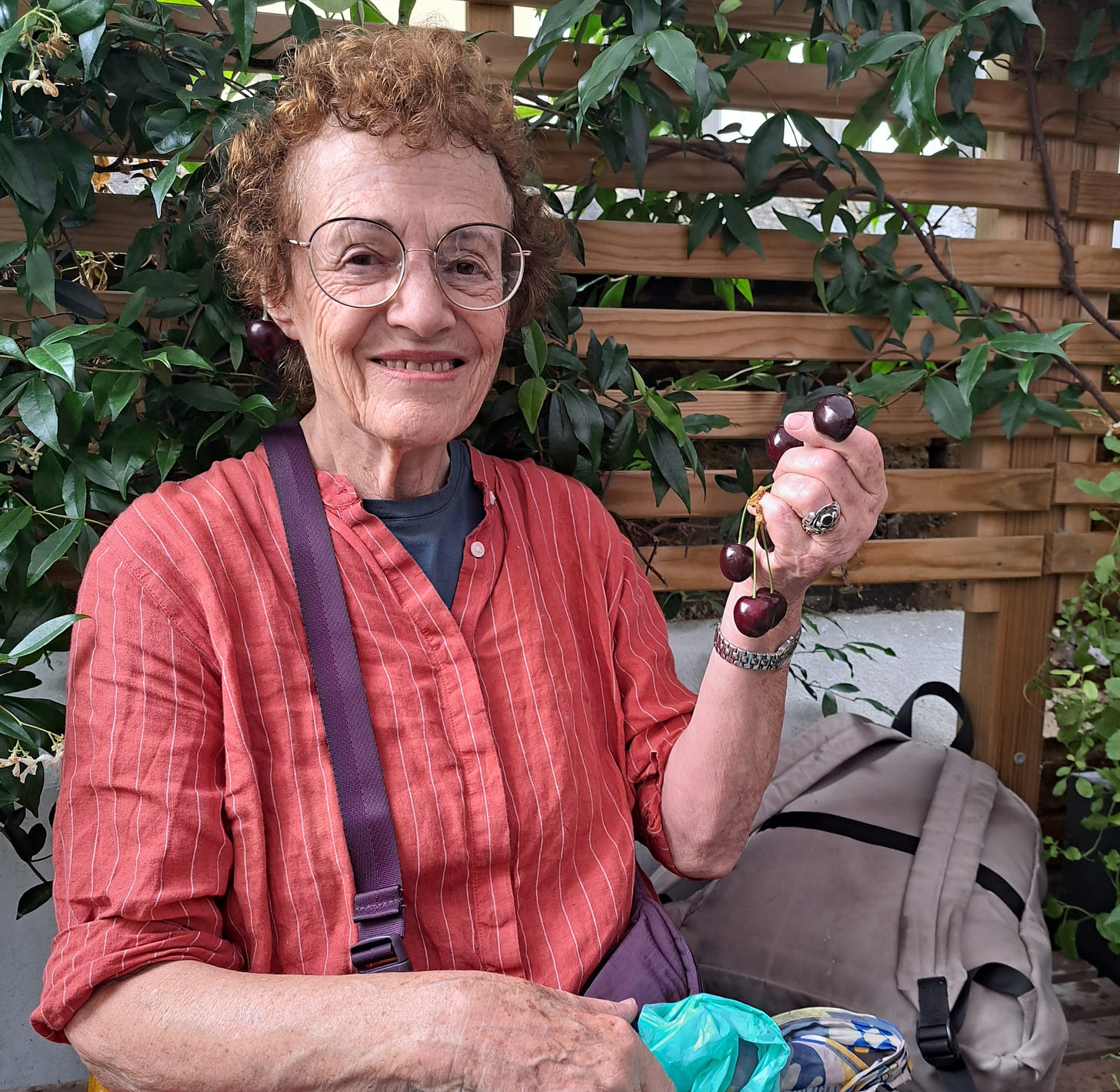
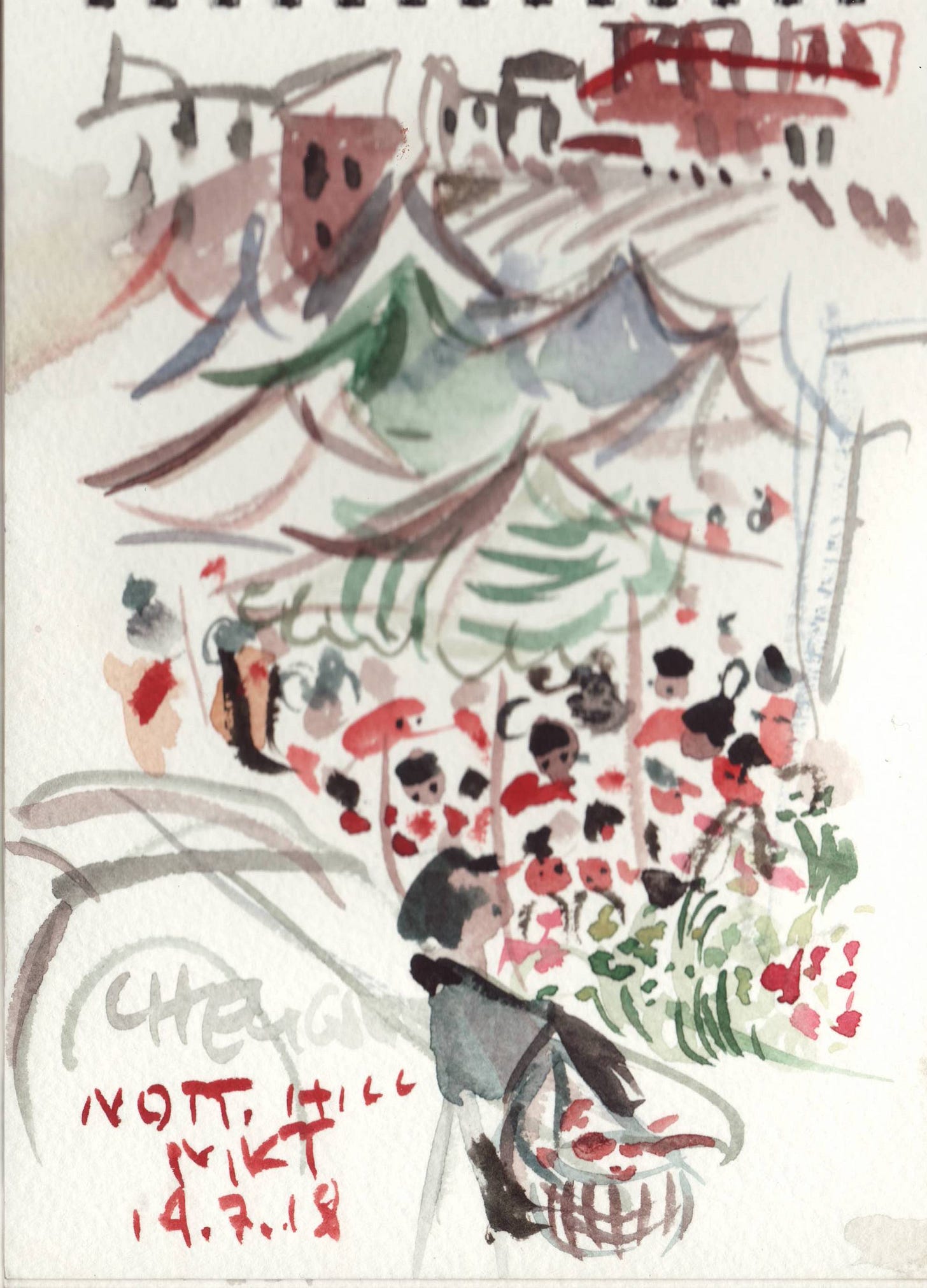
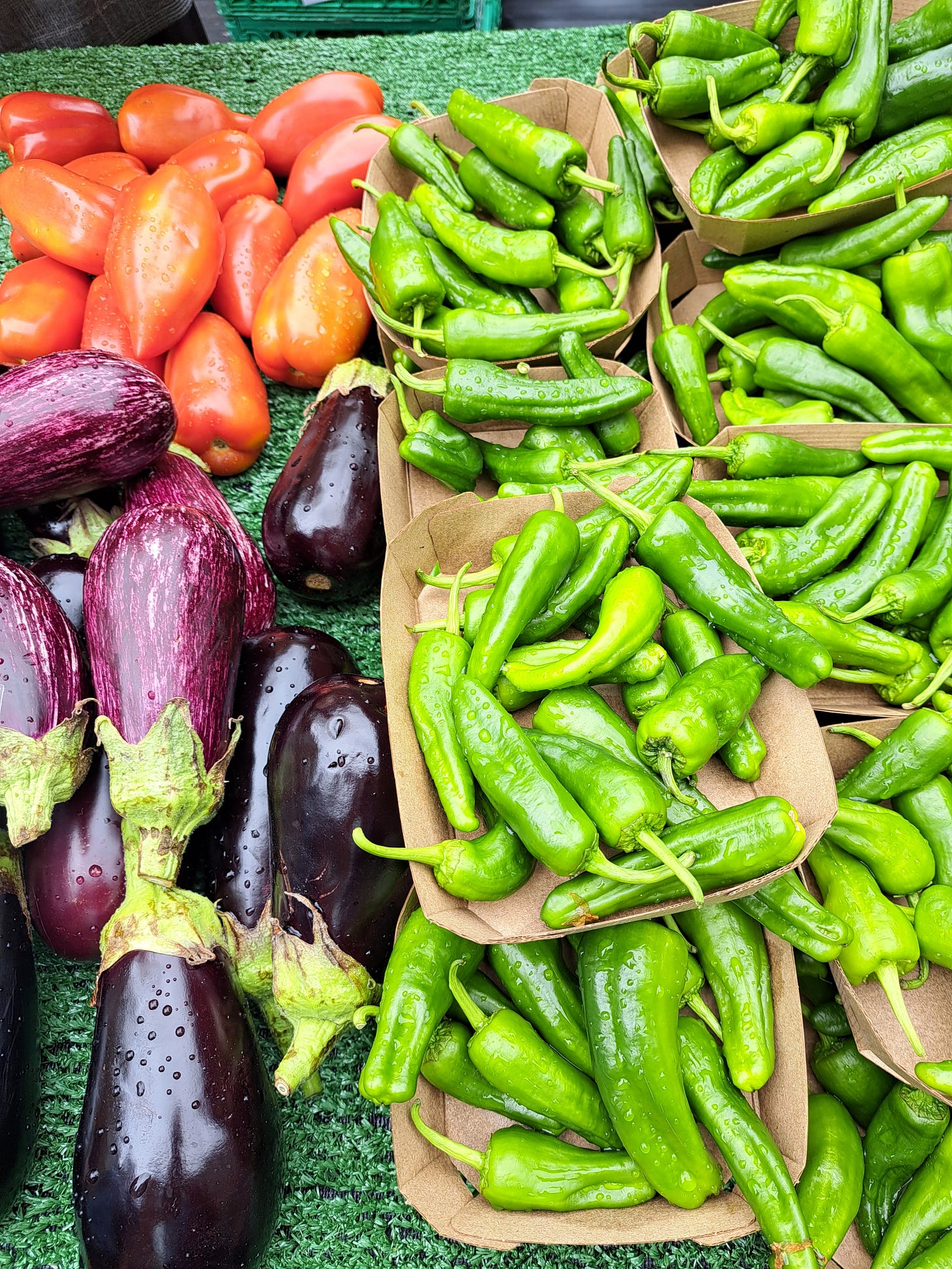

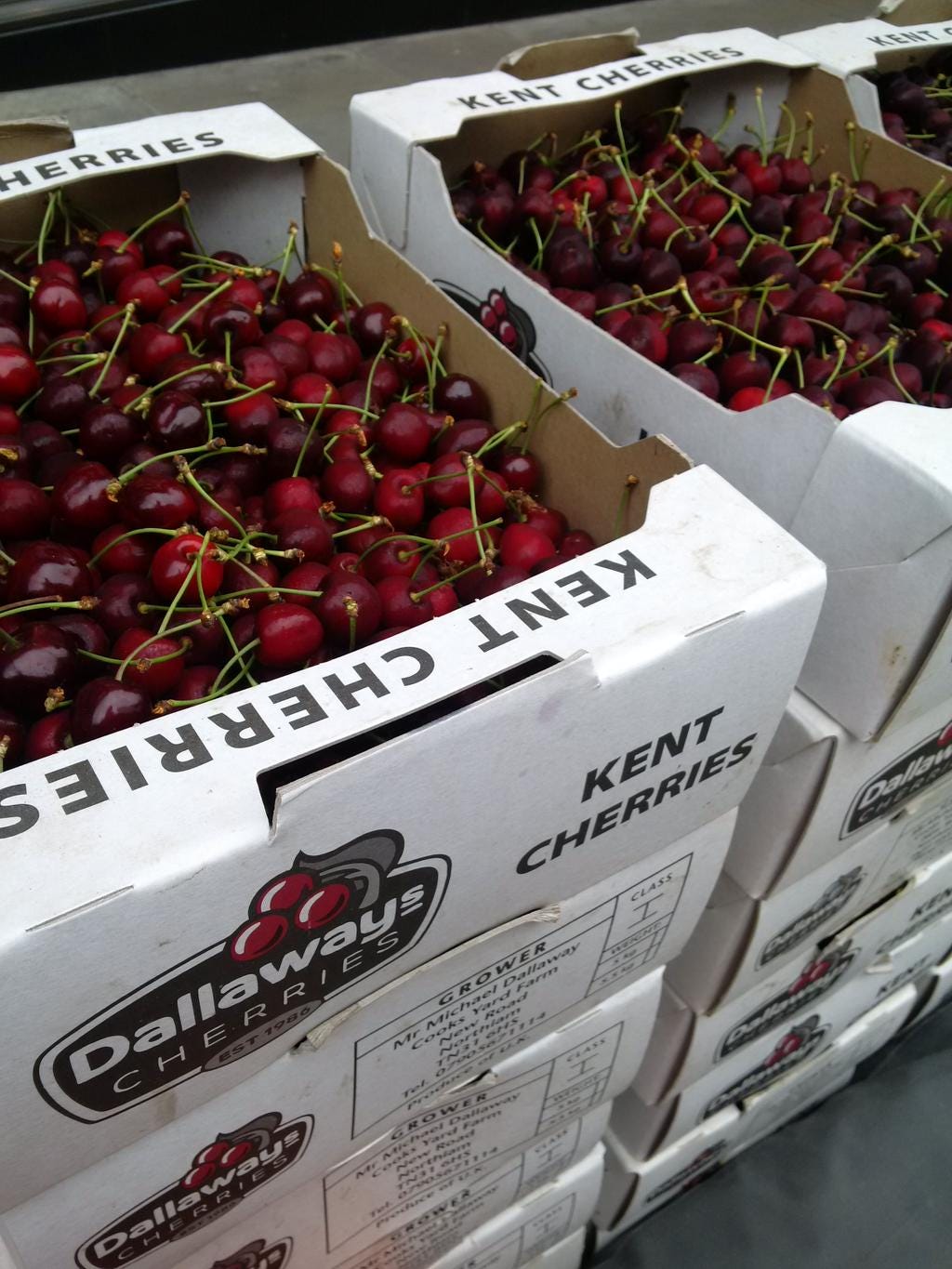


I really enjoyed this, for me, introduction to such an interesting woman. And it was fun to, sort of, go on a farmers' market shopping trip with her.
Enjoyed reading this. Hooray for Elisabeth - and for farmers' markets!